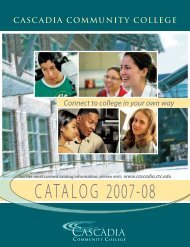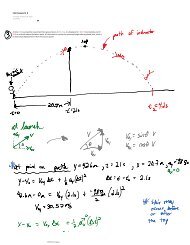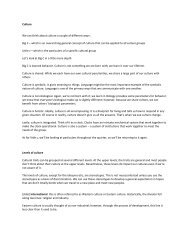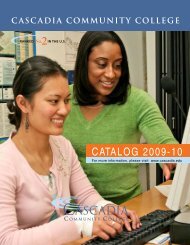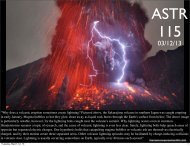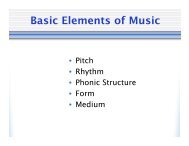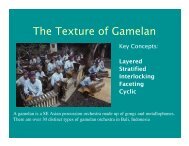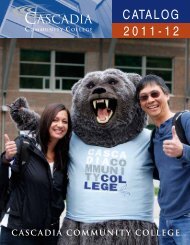CATALOG 2010-11 - Cascadia Community College
CATALOG 2010-11 - Cascadia Community College
CATALOG 2010-11 - Cascadia Community College
- No tags were found...
Create successful ePaper yourself
Turn your PDF publications into a flip-book with our unique Google optimized e-Paper software.
DESIGNATION KEYDistribution areas: CKR = Cultural Knowledge, E = Elective, GS = Global Studies, H=Humanities, HP = Humanities Performance, NS = Natural Science, Q=Quantitative Reasoning, RE=Restricted Elective , SS = Social ScienceCourse DescriptionsENVS 1505 creditsThemes and Methods in theEnvironmental SciencesGS, NS- This course is an interdisciplinary explorationof environmental issues. Students willstudy specific environmental concerns within aconventional environmental science frameworkin order to thoroughly understand their natureas well as develop realistic solutions. Studentswill be required to conduct research, gather ,andanalyze actual data, develop conclusions, anduse those conclusions to develop and analyzepolicy. Prerequisite(s): Completion of ENGL090 with a grade of 2.0 or higher or placementby testing in ENGL 100.ENVS 2105 creditsEcology of Puget SoundNS- Regional environmental change withinPuget Sound is the focus of this course. Studentslearn the characteristics and functions ofecological systems in the region and examinecurrent controversies surrounding urbanization,species protection, and resource protection.Prerequisite(s): Completion of ENGL 090 with agrade of 2.0 or higher or placement by testing inENGL 100. (LAB)ENVS 2205 creditsWetland Ecology and ConservationNS- Wetlands are a valuable and integralresource in both urban and rural environments.This course will examine the functions andvalues wetlands provide through the uniqueinterplay that exists between soils, hydrology,and the biotic community in these environments.Students will explore the large wetlandrestoration project located on-campus through‘hands-on’ field laboratories. Off-site field tripswill also be taken to examine the diversity andvariability of local wetlands. Prerequisite(s):Completion of one of the following: BIOL 120or greater, CHEM& 121 or greater, ENVS& 101 orgreater, GEOL& 101 or greater, or NSCI 101 witha grade of 2.0 or higher. (LAB)ENVIRONMENTALTECHNOLOGY ANDSUSTAINABLE PRACTICESETSP 1015 creditsIntro to EnvironmentalTechnology and SustainablePracticesRE- This is a survey course of environmental technologiesand sustainable practices in business,manufacturing, and in the home. Topics includewaste management and recycling, pollutionprevention, sustainable development, selectionof environmentally-friendly materials, resources,supplies and processes, energy sourcing andmanagement strategies, and environmentalregulations. Includes addressing of social justiceand triple bottom line issues. Prerequisite(s):Completion of ENGL 090 with a grade of 2.0 orhigher or placement by testing in ENGL 100.ETSP 1025 creditsPower Generation andConventional Energy SystemsRE- This course covers the generation, transmission,and distribution of electrical power tolarge areas and presents the history, currentstatus, and trends in conventional energysystems and how they are integrated in modernsociety. Topics include performance and efficiencyof different energy systems; utility gridmanagement systems and strategies; methodsof modeling distribution systems; economicaspects of power generation and distribution;energy metering, auditing and resource;management of current technologies andinfrastructures; and the challenges of meetingthe expanding consumer demand for energy.Prerequisite(s): Completion of PHYS <strong>11</strong>1;completion of ENGL 090 with a grade of 2.0 orhigher or placement by testing in ENGL 100.ETSP <strong>11</strong>05 creditsConventional Energy SystemsRE- This course presents the history, currentstatus, and trends in conventional energysystems and how they are integrated in modernsociety. Topics include current technologiesand infrastructures, smart grid, communityscale distribution systems, and the challengesof meeting expanding demand for energy integrationwithin communities. Students researchand discuss the advantages and limitations ofconventional systems with a focus on sociotechnicalaspects of community energy systems.Prerequisite(s): Completion of PHYS <strong>11</strong>1 andETSP 101 with a grade of 2.0 or higher; andcompletion of ENGL 100 with a grade of 2.0 orhigher or placement by testing in ENGL& 101ETSP 1205 creditsSolar Energy SystemsRE- This course covers the basic principlesand technologies that relate to solar energysystems, including radiation fundamentals,measurement, and data processing requiredto predict solar irradiance with respect totime, location, and orientation. Students willreceive an overview of current technologiesand emerging trends in the application of solarenergy systems; the different types of solartechnologies, collectors and storage systems;the economics of solar energy systems, paybackand life cycle costing; and basic design, installationand maintenance of these systems. Solarpower ranging from the heat of the day to solarelectric conversion technologies will be coveredincluding solar electric (photovoltaic); thermal;and heating, cooling, and lighting (active andpassive). Prerequisite(s): Co -enrollment in orCcompletion of PHYS <strong>11</strong>1; completion of ENGL090 with a grade of 2.0 or higher or placementby testing in ENGL 100.ETSP 1305 creditsAlternative Energy GenerationSystemsRE- This course presents current and emergingtechnologies related to wind, biomass, wave/tidal, and geothermal energy systems, andtheir associated economics, challenges, andpolicy issues. Topics include: the nature of windenergy, wind data, predictions, and its seasonalinfluences; the various designs and performanceof wind turbines and wind farms; biological andthermo-chemical methods for the conversionof biomass to biofuels; sustainability attributesand environmental impact; geothermalenergy forces and geographic distribution;and sustainability and environmental impacts.Prerequisite(s): Completion of PHYS <strong>11</strong>1;completion of ENGL 090 with a grade of 2.0 orhigher or placement by testing in ENGL 100.ETSP 1405 creditsBiomass Generation SystemsRE-This course presents current and emergingtechnologies related to biomass conversionprocesses and systems for the production ofenergy. Topics include biological and chemicalmethods for the conversion of biomass directlyto energy, to energy intensive intermediaries,or to biofuels; economics of biomassenergy; finance of biomass projects; sustainabilityattributes and environmental impact.Prerequisite(s): Completion of PHYS <strong>11</strong>1 andETSP 101 with a grade of 2.0 or higher; completionof ENGL 100 with a grade of 2.0 or higher orplacement by testing in ENGL& 101, or instructorpermission.ETSP 1502 creditsOSHA/WSHA for Electronic TradesRE- This course provides a survey of OSHA’s andWSHA’s electrical standards and the hazardsassociated with electrical installations andequipment. Topics include single and threephase systems, cord and plug connected andfixed equipment grounding, ground fault circuitinterrupters, hazardous locations, and safetyrelatedwork practices. Emphasis is placedon electrical hazard recognition and OSHA/WSHA inspection procedures. Prerequisite(s):completion of ENGL 090 with a grade of 2.0 orhigher or placement by testing in ENGL 100.ETSP 1603 creditsMechanic LabRE- The mechanical lab course is specificallydevoted to solving mechanical designproblems and applying practical methods offabrication and testing using hands-on projects.Prerequisite(s): Completion of ENGL 090 witha grade of 2.0 or higher or placement by testingin ENGL 100.90 Catalog <strong>2010</strong>-<strong>11</strong> <strong>Cascadia</strong> <strong>Community</strong> <strong>College</strong>



